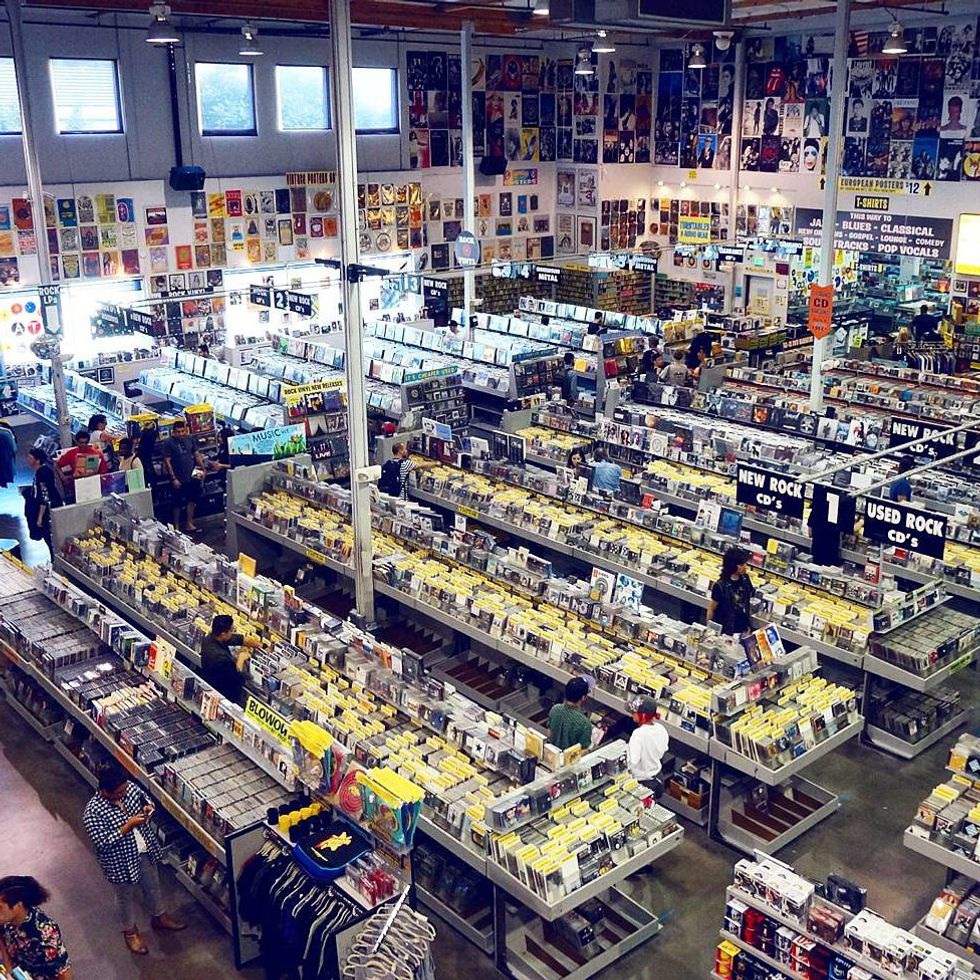I grew up in a relentlessly digital world that exploited the age-old idea of "in with the young and out with the old". When I was three years old, I listened to warped tapes on a boombox in the middle of the night, when I wasn't supposed to. My parents bought me a portable CD player that would skip when I walked but it was mine. Then as a teenager, I was steeped in the iPod craze of the mid-2000s that kept me rotating generations of mp3 players for several years. However, I continued to purchase physical music for one reason or another. But on a particular trip to my favorite music store, Amoeba Hollywood, I found a worn vinyl copy of Pink Floyd's Dark Side of the Moon. I stared at the giant prism in my hand. It was pressed in 1973. It was an ordinary copy to the store but to me, it was something more. It was the real thing! I carried it under my arm confidently and asked my parents to buy it for me. They both bombarded me with reasons not to take it home: you don't have a record player, records sound terrible compared to mp3's, they wear out, they are a hassle to store and flip, they are a dead format etc. It goes without saying that I left Amoeba with a CD in my hand. I also left with my frustrating urge to own a turntable.
After a few years of saving Birthday/Christmas money I spent it on the first record player I could find. Of course, it was a Crosley at Target since I knew nothing about turntable quality at that point. I picked up two dollar-bin records at my local record store and took them home. I was nervous. I wasn't sure what this was leading to. "Is this just a fad? Will I be tossing this stuff within a year? What if my parents were right? They DID live through the decline of turntables.", all running through my head. As I placed the needle on the end of that record, the dusty fuzz was immediately heard through the speakers. It came into my home with a history, another life with a different owner. It was warm, and although the turntable was not the best it filled my room just as it filled another's many times. That night I probably played those two albums half a dozen times and watched the label spin. That's when my love affair with vinyl records began. Since then, I've let go of the old Crosley and upgraded my equipment whenever possible but that same passion still burns inside.
My infatuation is multifaceted, it's not all about the joyful inconvenience of having to flip a record every 20 minutes. It's not a solely physical affection. When it comes to records or any other analog form of music for that matter, it will always be superior to digital forms of music. In short, the term "analog" refers to records, cassette tapes, and 8-tracks and digital refers to CD's and mp3's. The latter group was created to compress music for convenience but left behind a noticeable amount of quality. As shown in the graph, the analog signal is smooth whereas the digital is discontinuous and requires breaks between each signal. This ultimately comprises sound quality and we hear less information from the music. Digital is merely a blurred replica of the real piece of art. It may be easy to carry on a mobile device but it shortchanges audio quality.
Of course, most people are not willing to pay for music anymore. I understand we live in a streaming world, with playlists running with a shuffle button. We have looked beyond the fact that it can take up to several millions of dollars to write, rehearse, produce, record, duplicate, promote (touring, plugging, marketing) and embed music into your soul to the point that the lyrics live on the tip of your tongue. I get it. But as anyone who has invested their dedication into a solid stereo system will attest, it pays off tenfold. It isn't a hype, it is a part of music appreciation that was lost amongst the streamlined music industry for the sake of profit, convenience and corporate greed. After the 1970's, also known as the "golden age" of audio equipment, there began a steady decline in craftsmanship in order for people to constantly have to replace gear. Once great audio companies like Marantz, Pioneer and Sansui were no longer interested in selling products that lasted a lifetime and decided to go along with the disposable mindset of buying new versions of things every other year. As I write this, I'm listening to music through audio equipment that was built in the early 70's and they will probably outlive me. That's exactly the type of quality that existed during that era.
I urge every person who wishes to dive in, to experience the difference. I can't recommend Crosley turntables since they were built as novelty players. However I still won't knock them since they were the catalyst behind the recent vinyl resurgence, and also built my first record player. But as I learned with experience, Crosley turntables are not built with an adjustable tonearm, which allows either too little or too much pressure from the needle onto your record (mostly the latter). This causes premature wear on valuable albums. Instead, make time for some late-night research to narrow down your choices. As you will find, there is a wide variety of price ranges. Be willing to start at a few hundred dollars but find one that suits your budget. I realize that it may be a giant leap from all the free music found online but there is a very good reason why it's free. When you put the needle down and it finds that groove, you'll know the difference.


























